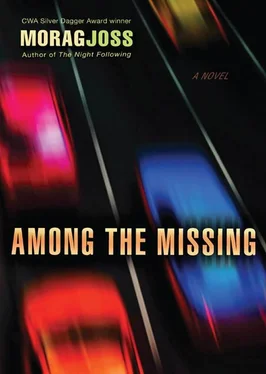It begins as a high keening, a wail that strangely comes and goes as if Marjorie’s whole body is spilling away into a place that’s bottomless and echoing, as if she is drowning in her own agony and also trying to struggle up out of it, screaming with terror. It rides over other sounds: the whistle of the kettle on the gas, the last bubble of water boiling dry in the unwatched pan, and the snap of glass as the feeding bottle bursts, the hiss of milk curds roasting on searing hot tin.
And Irene is rooted in the kitchen doorway and has no words to meet anything as fearsome as this, Marjorie with that look on her face, clutching her dead baby against her and screaming, Marjorie bursting her way out the front door and making off down the road still screaming, holding out her child to people who are now coming from their houses to see what the noise is about. Irene cannot follow. She is trying to stop her bones from shaking themselves loose inside their thin wrappings of muscle, she has set her jaw against letting her own screams escape; she holds on to the doorposts, but sudden pains are shooting inside her and she can’t control the noxious rocking in the cavity of her stomach, which now is slopping with vomit and disgorging it, without warning, all over the floor.
Though she survived another thirteen years, I am certain my mother was never free of the noise of that afternoon in her head, its heat on her skin, the taste of it in her mouth. It made no difference to her that the inquest concluded three weeks later it was a cot death. She had never heard of cot death. Babies sometimes just stopped breathing for no known medical reason, it was mercifully rare but becoming more common? That was no explanation at all. The doctor and coroner were merely giving a name to some newly invented peril for healthy babies. Cot death? The child had died in Irene’s care. She should not have touched her. She should have picked her up. She should have covered her, uncovered her, turned her on her side, not turned her, opened the window, closed the window. She should have kept her alive. In taking the blame on herself, she was not discouraged by the Porters nor, it seemed, the whole town. Nobody else had heard of cot death, either.
My mother came to believe, once she could no longer deny that the disturbance in her own body was a pregnancy, so late and unlooked-for it felt unnatural, that she had taken Annabel’s life as surely as if she had choked the child or driven a blade through her chest. Because there must have been a moment when she had sucked the life out of the baby’s unconscious body and drawn it up, somehow, into hers; that must be why she had left the darkened nursery forgetting to whisper “God bless you,” and feeling even more nauseous and drowsy and faint.
And it wasn’t enough that she believed she’d done it, my father told me, she still had to know how God could have let her. She spoke to her priest, not that it helped. He couldn’t convince her that some force within her had not stolen the child’s life. It must be, she reasoned, that in smoothing Annabel’s hair with too much yearning, she had tapped a well in herself that was not love at all but some distortion of love, something visceral and needy and covetous. She had craved her own baby too much, and there had been nothing to protect Annabel from such aching, unguarded cupidity. The child had been christened, and had that done a thing to keep her sanctified soul moored within her body? I imagined a flummoxed young minister reaching for the orthodox comforts about baptism and the life everlasting. But my mother would have shaken her head. No, God had declined to lift a finger to save Annabel, and so where did that leave it, the soul? Unprotected. Anywhere. Nowhere. There was nothing eternal, or still, or unique about it. It did not-it could not-belong to God. It was not merely unsanctified but unsanctifiable. She knew.
She left the church. Henceforth her soul, unsafe like every other, would have to look after itself just as Annabel’s soul, taking its chances, had proved itself restlessly and promiscuously fluid, capable of passing from person to person, its tenure always provisional upon the beckoning of its next nascent host. So it was that my mother, slaking some ancient thirst for her own child, had drawn Annabel’s supple, migrant soul out of her sleeping body and into her own, where it was to alight, and embed, and animate the simmering, multiplying cells that were even then readying themselves to be expelled exactly thirty-seven weeks later as me, the deplorable little thief whose veins raced with lifeblood stolen from Annabel Porter.
Cot death or not, new phenomenon or not, it was a cruelty of nature on a scale that was medieval, a calamity so woeful and mythic that it had, in fact, brought a chorus of women wailing onto the streets to prize the corpse of an infant from the arms of its deranged, barefoot mother. I think it might have saved my mother’s sanity had her part in the affair been condemned outright as diabolical; an explanation, however anachronistic, that blackened her reputation with the name of witch might have been preferable, in the months that followed, to her neighbors’ askance looks and hasty crossings of the street. The Porters moved away. I was born, and for the next thirteen years my mother did not leave the house to go any farther than the back garden visible behind the fence in the photograph.

When Ron began to help us, I thought it was because he is kind; now I think it is because he likes us. We are doing very well. Annabel is eating like a pig. He has noticed it, and that must be why he brings us so much food as well as all the other things. But I do not think he has noticed why she is so hungry. Her stomach is beginning to show, but he doesn’t look at her body, or at mine. He watches our faces. When he finds out Annabel is having a baby, I think he will help even more. He is a good man. When you come back, he will be like a grandfather to Anna.
Sometimes, when Annabel is thinking about something far away, or is asleep, the look on her face is so smooth I could cry with envy. Sometimes my stomach and throat shut themselves tight when I think of her body getting ready, the way mine did with Anna. I feel a prickling in my breasts the way I did when our baby was suckling. When you come back, I want us to have another baby.
Of course I have wondered if you are dead, but you aren’t. It isn’t possible. I need you too much for you to be gone forever. You can’t be dead because if you are, Anna must be, too, and that isn’t possible, either. I need her too much for her no longer to exist. There is no other need or purpose or reason in this world stronger than my need to hold you both in my arms. You are coming back.
Until then, I’ll watch Annabel grow heavy and lazy, and I’ll take care of her as if the child inside her was mine. We can stay here for a long time, as long as we like, as long as we need. Until you come back and we have our own new baby, there will be Annabel’s to look after.
I didn’t know until now how beautiful the forest is. The trees stand all around us like guarding giants, and they have a smell that is strong and clean, and the sound the branches make at night is a safe sound, like me saying shoosh-shoosh to Anna when she cries.

The Porters left; why didn’t we leave, too? There was nothing about the house or my father’s job at the council that could not have been replicated elsewhere. Was it heroism that made my father choose to stay and stand by his wife in front of the whole town, or was it simple obstinacy? Or was it a failure of imagination-at a time when every family in England that wasn’t doing it themselves knew of some other family, someone at the office or down the street, that was packing its life into oceangoing containers and emigrating to Australia or Canada-that he could not envisage the three of us embarking on a journey even as far as the next county? I think it most likely that by the time he thought of moving us anywhere it was already too late. Our lives were too ingrained in the causes and effects of my mother’s entrapment to withstand any such uprooting.
Читать дальше














